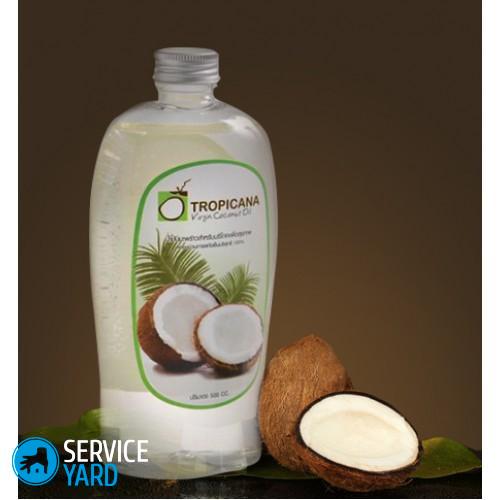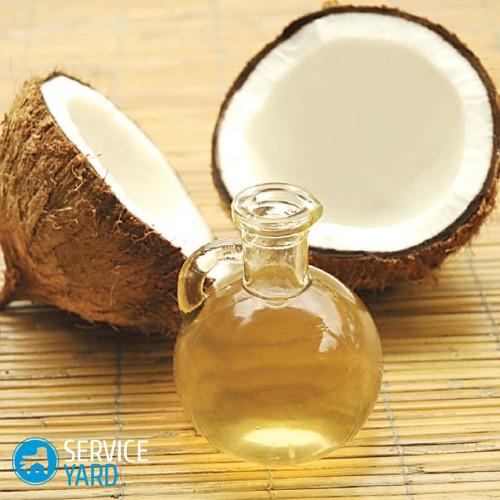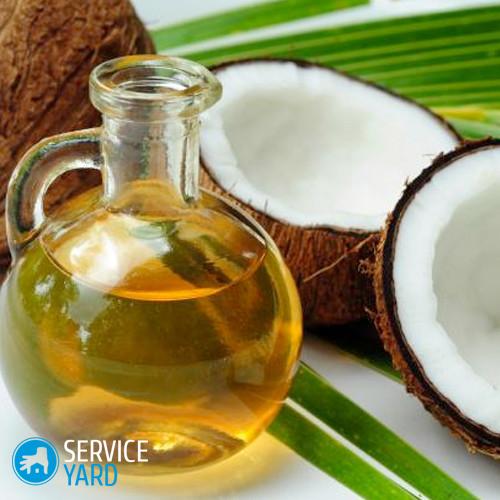How to store coconut oil?

To date, shopping stalls offer a huge selection of oils - both ordinary cheap and more expensive and exotic. Coconut oil is among the best, and every day the demand for this product is increasing. Therefore, there is a need to know how to store coconut oil. At its inexpensive price, a coconut oil product is not only tasty, but also very healthy. However, it does not require any special storage conditions. But about everything that relates to the storage and use of this product in the order in this article.
to contents ↑Coconut Oil Composition
The composition of the product includes a large number of acids, which together have high healing properties.
Lauric acid (50-55%):
- It has an antibacterial effect.
- It fights pathogenic viruses and bacteria in the body. Promotes the rapid healing of cuts, microcracks and other epidermal disorders.
- Improves the condition of the skin - prevents the formation of premature wrinkles, age spots, makes it supple, healthy and young.
Oleic acid (6-11%):
- Helps to restore the protective properties of the upper layers of the skin.
- It maintains a water balance favorable for a beautiful appearance and skin elasticity.
- It prevents the accumulation of excess fat on the surface and in the structure of the skin. And when there is a risk of a significant increase in the volume of such substances, these processes quickly stop through their local destruction.
Palmitic acid (10%):
- It plays a significant role in updating the cutaneous intercellular substance.
Caprylic acid (5-10%):
- Normalizes the acid balance of the skin.
- Saturates skin cells with oxygen.
- It improves the metabolic processes of the intracellular space, thereby prolonging the youth of the skin cells.
Myristic acid (10%):
- Helps stabilize protein levels in the body.
Capric acid (5%):
- Strengthens the body’s immune system.
- Protects the gastrointestinal tract from pathogenic viruses, bacteria and fungi.
Stearic acid (3%):
- Restores the protective properties of the skin.
to contents ↑Important! Observing all the rules of how to store coconut oil, you can easily maintain the condition of your skin and other parts of your body in perfect condition for a long time.
Benefits of Coconut Oil
It is not so important whether you bought coconut oil, liquid or solid, the use of this product has a very beneficial effect on the internal organs in particular and the human body as a whole. The main useful properties are as follows:
- The skin becomes more velvety.
- Hair gains strength, brittleness disappears, hair follicle strengthens.
- Coconut oil perfectly nourishes and moisturizes the skin, prolongs its youth.
- It has a healing effect on the damaged epidermis.
- Reduces pain.
- Protects the epidermis from the damaging effects of ultraviolet rays, bacteria, viruses.
- Helps lower blood sugar, which is especially beneficial for people with diabetes.
- It has a beneficial effect on the normalization of weight, which is important for people with excess weight.
- It has a beneficial effect on the well-being of a person, relieves stress and fatigue.
Coconut Oil
Coconut oil is most commonly used in areas such as medicine and cosmetics. Scientists have done a lot of research and proved that coconut oil can be used for the following purposes.
In medicine:
- For oral hygiene - the product perfectly strengthens the enamel and resists the appearance of caries.
- As an antibacterial agent - can be used as a means to combat the fungus on the feet.
- For the treatment of the gastrointestinal tract - relieves intestinal pain and helps digestion.
- With stomach ulcers.
- For the treatment of jaundice.
- With hemorrhoids.
- In the treatment of thrush.
- For the treatment of an allergic skin reaction.
- To enhance immunity.
- With arthritis.
Important! You should never self-medicate. All doses for internal administration of the drug should be prescribed only by the attending physician. You only need to clearly fulfill these assignments and properly store coconut oil.
In cosmetology:
- As a sunscreen.
- Instead of moisturizing lotion.
- As a makeup remover.
- In diapers for children - as an impregnation from diaper rash.
- As a means to eliminate age spots.
- As skin and hair care products.
Product Selection Criteria
Everyone can find out what coconut oil looks like, since today it is sold in almost all tropical countries. Recently, it can be purchased in our stores, as well as prepared independently at home.
Important! Do not purchase coconut oil online if you are unsure of the manufacturer.
To be sure of the quality of the product, you need to know what to look for when buying it:
- Packaging. Before buying, inspect the bottle in which the product is located for defects and seals. The presence of one or the other may affect the quality of the product you have chosen.
- Appearance. Pay attention to what coconut oil looks like. The color of the product should be in the range from transparent to light yellow.
Important! Too dark a color of coconut oil indicates poor cleaning, which leads to a decrease in the quality of the liquid.
- Smell. Be sure to check the smell of coconut oil. Good quality raw materials have a pleasant, delicate aroma of coconut.
Important! If the smell is sharp and concentrated, most likely, chemical additives were used in its manufacture.
- Consistency. At a storage temperature below 25 degrees, the raw material may thicken, but coconut oil, liquid or solid, does not lose its properties. It may begin to melt immediately on the skin. If this does not happen, melt it by placing it in a warm place.
- Shelf life. Be sure to pay attention to the shelf life of the product upon purchase. A natural product without preservatives can be suitable from 6 months to 1 year.
to contents ↑Important! A longer shelf life may indicate the addition of additional chemical components that may be harmful to health.
Kinds of Coconut Oil
Coconut oil can be of two types: refined (refined) and unrefined (first extraction). Unrefined is cleaned mechanically - this is how a greater amount of nutrients is preserved.
There are also several types of spin. The most high-quality is the method of "cold pressing". With this processing method, the naturalness of the product is completely preserved.
to contents ↑Important! If you are making a purchase of such a product for the first time, then start with cold-pressed oil. Its taste is more delicate and natural.
How to store coconut oil?
Coconut oil is often used as a dietary supplement. However, the shelf life of this product is not too long, so it is not recommended to buy it in large volumes.
This product is not picky, but in order to extend its shelf life, you should follow a few simple rules on how to store coconut oil.They are as follows:
- Store better at a temperature not exceeding 20 degrees and humidity not less than 60%.
Important! The best option for storage would be a cool place.
- Choose a storage container with a tight stopper to limit air ingress.
Important! The screw cap does not provide a tight seal on the neck of the bottle. Air entering the coconut oil container may result in oxidation of the product. Close the bottle tightly after use.
- Consider a place to store coconut oil better. It must be protected from direct sunlight.
Important! It is not recommended to store coconut oil in a plastic container, as over time, plastic can release harmful chemicals. If you purchased the product in such a bottle, immediately pour it into a glass one. A tinted glass container is considered the best option.
- If you purchased the oil in a large container, transfer it to a smaller container and close the rest tightly. Thus, you will save him from rancidity.
Important! It is not safe to store food in metal containers. When products interact with metals, harmful substances are released that can harm your health.
How to store coconut oil made by yourself?
Fans of cooking coconut oil at home should know that the rules for its storage are no different from the rules for storing industrial oil.
Important! The shelf life of a self-cooked product is several times less than the store. Approximately it is about two weeks. After this period, the use of the product may be hazardous to health.
How to store the drug in capsules and ampoules?
As already mentioned above, you can buy coconut oil, liquid or solid. Liquid is not only available in bottles. It can be purchased at:
- portioned ampoules (glass);
- capsules (plastic).
Important! The storage method of such oil is also no different from the recommendations for storing a product that is sold in a larger container.
To test the suitability of the raw materials, open the capsule and drip a small amount. The color of a good oil should be bright yellow. Otherwise, the oil should be transferred to a cool place.
to contents ↑Important! As in the case of ordinary oil, the oil product in capsules and ampoules should be stored in the original packaging, tightly closing it after use to protect it from exposure to sunlight.
Stock footage
The beneficial properties of coconut oil have been known for a long time. By including it in your diet, as well as using it for cosmetic purposes, you will not only get rid of many diseases and prevent them, but also help your skin and hair to find a beautiful and healthy look.
- How to choose a vacuum cleaner taking into account the characteristics of the house and coatings?
- What to look for when choosing a water delivery
- How to quickly create comfort at home - tips for housewives
- How to choose the perfect TV - useful tips
- What to look for when choosing blinds
- What should be running shoes?
- What useful things can you buy in a hardware store
- Iphone 11 pro max review
- Than iPhone is better than Android smartphones






